Acupuncture treatment for depression and anxiety

For thousands of years, acupuncture has been used to treat various health problems. Now, this ancient practice is finding its way into modern mental health care.
Psychiatrist Ashley Walters, MD, offers auricular therapy, or ear acupuncture, to help treat depression and anxiety – as a complement to the more conventional treatment she provides.
Dr. Walters recently completed a fellowship in integrative medicine, studying ear acupuncture and other healing practices that enhance traditional patient care.
What is integrative medicine?
Most Americans know about Western medicine, which uses proven treatments to target symptoms and diseases.
"Integrative medicine seeks to integrate traditional Western medicine with evidence-based complementary methodologies," Dr. Walters explains.
This can include:
- Traditional Chinese Medicine.
- Diet, exercise and other lifestyle measures.
- Supplements.
- Botanicals.
- Meditation.
- Guided imagery.
- Massage.
- Yoga.
In mental health care, an integrative approach combines standard treatments – like medication and therapy – with complementary therapies. Examples include acupuncture, breath work and mindfulness.
"Traditional psychiatric treatments are incredibly helpful to a number of people," Dr. Walters says. "But there are so many other treatment offerings that can round out a person's treatment, when they are interested in coming at it from different approaches."
How ear acupuncture works
In acupuncture, thin needles are placed at specific points on the body to stimulate healing.
"According to Traditional Chinese Medicine, acupuncture works by restoring the flow of Qi, or life force energy," Dr. Walters says. "With more recent studies, it's thought to be mediated by the endogenous opioid system. Studies have shown that endorphin levels increase in the blood and cerebrospinal fluid during acupuncture."
With ear acupuncture, tiny disposable needles are inserted into points on the outer ear. While whole-body acupuncture has existed for thousands of years, auricular therapy is fairly new.
"It was developed in the 1950s by a French physician," Dr. Walters says. "It seems to have good evidence for a number of indications, including mental health."
Research shows auricular therapy may help with:
- Supporting substance abuse treatment.
- Providing a sense of stillness and well-being.
- Helping patients engage better in mental health treatment.
- Reducing impulsivity.
Ear acupuncture protocols
Dr. Walters uses two types of acupuncture in her practice:
- National Acupuncture Detox Association (NADA) protocol: Originally used for addiction treatment, this method is also helpful for anxiety, depression, stress and sleep disturbances. It may have an immediate calming effect.
- Auricular Trauma Protocol (ATP): Developed for trauma treatment, ATP has shown promise in treating depression, anxiety, panic attacks, insomnia and pain.
What patients can expect
During a regular psychiatric appointment, Dr. Walters places tiny needles in specific ear points for 20 to 30 minutes.
"The needles that are used for ear acupuncture are especially tiny and short," Dr. Walters says. "The needle is about a quarter of an inch long and almost hair-like in diameter. Sometimes people don't even feel them."
Patients often report feeling calmer during and after the treatment. Risks are minimal and may include mild discomfort or very minor bleeding. People nervous about needles might feel dizzy, but serious side effects are rare.
Is ear acupuncture right for you?
Dr. Walters believes most people interested in trying acupuncture can benefit from it. Patients taking blood thinners might not be good candidates, but the treatment is generally safe for most adults. However, Dr. Walters emphasizes that it is optional and offered only as an add-on therapy for patients interested in trying it.
Getting started with ear acupuncture
To explore ear acupuncture with Dr. Walters, you must first become her psychiatric patient. Once established, you can discuss whether ear acupuncture might be a helpful addition to your care plan.





